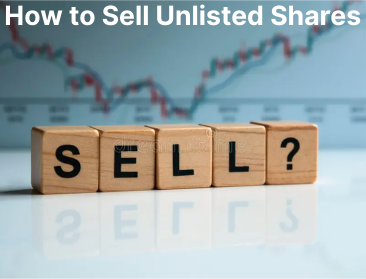15 Days Price Change

Summary
Investing in unlisted shares is becoming quite popular these days. Many investors see it as a way to get early entry into promising companies before they hit the stock market but when it comes to selling these shares the process isn’t as straightforward as selling listed ones. There are specific steps to follow some rules to be aware of along with certain risks you need to keep in mind.
In this guide, we’ll break down what unlisted shares are, how you can sell them in an unlisted market , the tax aspects involved and the key risks to watch out for before any step.

What are unlisted shares
Unlisted shares are simply shares of a company that you can’t buy or sell on public stock exchanges like NSE and BSE instead they’re traded in private deals either directly through OTC (over the counter) transactions or via specialised brokers(Unlisted shares platform) who connect buyers and sellers.
These companies could be fresh startups, established private firms or those companies who are getting ready to go public.
Some examples:
Investors like them because they get a chance to get in early before the big IPO buzz and potentially see huge returns as the company grows but the investors must be aware while investing because these shares are harder to sell quickly and may carry more risk than listed stocks.
In short - They are Risky but Highly Rewardable Investments.
Step by Step Process to Sell Unlisted Shares
Selling unlisted shares is slightly different from selling listed shares on the stock exchange since they are not traded on NSE or BSE the process works through private transactions. Here’s how you can sell your unlisted shares on SharesCart.com:
Step 1 - Place a Sell Request:
Visit SharesCart.com and click on the Sell button for the company whose shares you want to sell then enter the quantity of shares you wish to sell and submit your request.
Step 2 - Now you will Get Connected with a Relationship Manager:
A Relationship Manager (RM) will contact you from the company to confirm your sell request in which they will discuss the quantity, expected price and guide you through the entire selling process.
Step 3 - Share Your Demat Details:
You will receive an email from SharesCart asking for your Client Master Report (CMR) of your Demat account. This document is necessary to verify and initiate the transfer of shares.
Step 4 - Transfer the Shares:
Once a buyer is confirmed, you will be asked to transfer the agreed quantity of shares to the company’s Demat account.
Step 5 - Receive the Payment:
After the transfer is completed the verified payment will be made to your bank account. Usually you receive the funds on the same day or by T+1 (next working day) ensuring a smooth and secure transaction.
Selling Unlisted Shares After an IPO
When you invest in unlisted shares, you’re free to sell them in the private market anytime but the moment a company decides to go public a few rules and restrictions come into play.
Here’s what you need to keep in mind:DRHP and IPO are Two Different Steps:
The process starts when a company files its Draft Red Herring Prospectus (DRHP) with SEBI.
Think of this as the company asking for SEBI’s approval to launch an IPO.
Once SEBI gives the green light then the company usually brings the IPO within 2 to 4 months but if they fail to do so within 12 months then they’ll need to file the DRHP all over again.Trading After DRHP Filing:
Just because a DRHP is filed doesn’t mean trading stops; you can still buy and sell those shares in the unlisted market until the IPO is announced.
ISIN Freeze Before IPO:
Here’s the turning point: once the IPO is officially announced the company’s ISIN (International Securities Identification Number) , a unique code allotted to the share gets frozen after a few days.
When this happens then there will be no more transfers between demat accounts are allowed meaning you can’t sell in the unlisted market anymore and if you want to exit before the IPO, you must sell before the ISIN freeze.Shares Automatically Get Listed:
If you don’t sell before the freeze then don’t worry your shares will automatically become listed shares once the IPO goes live.
The 6 Months Lock In Rule:
Here’s the catch. Even though your shares got listed you can’t sell them right away. SEBI has a 6 months lock-in period for pre-IPO shareholders. This rule is meant to stop big investors and promoters from offloading large chunks of shares immediately after listing which could crash the price.
In short: You’re free to sell in the unlisted market until the ISIN freezes after that your shares become listed and you’ll have to wait for 6 months before selling them in the stock market.
What About Taxes When Selling Unlisted Shares?
The tax treatment of unlisted shares is different from listed shares because they are not traded on recognized stock exchanges and also the holding period of shares plays a key role in deciding whether the gains are short term or long term:
Short Term Capital Gains (STCG):
If you sell unlisted shares within 24 months (2 years) of buying them then the profit is treated as short term capital gains. These gains are taxed as per your tax slab(0 to 30%)Long Term Capital Gains (LTCG):
If you hold the shares for more than 24 months then the profit is considered as long term capital gains. These are taxed at a flat 20% rate with indexation benefit (allows you to adjust the purchase cost for inflation hence less tax liability).In short:
Less than 2 years = Taxed as per your income slab (0 to 30%).
More than 2 years = 20% tax with indexation benefit.
Key Risks Involved in Selling Unlisted Shares
Unlisted shares can be exciting because they give you the chance to invest early in promising companies along with opportunities but there are also some very real risks you should be aware of before buying or selling them.
Liquidity Risk:
The biggest risk is liquidity which means you may not always find a buyer when you want to sell unlike the stock exchange where trades happen instantly because a lot of buyers are available but the unlisted market works privately so selling can take time and may require giving a discount.
Pricing Risk:
Since these shares aren’t traded on an exchange there’s no fixed market price mostly the valuations are negotiated and sometimes prices are inflated by hype so you may end up paying more than the real worth or selling for less if demand is weak.
Regulatory Risk:
The unlisted space is less regulated compared to listed markets while SEBI keeps an eye the rules are not as strict which means higher chances of fraud and unfair practices if you don’t deal with trusted platforms.
Lock-In and Exit Restrictions:
If the company does go public, remember pre-IPO investors face a 6 months lock in period which means you can’t sell your shares immediately after listing even if the price is attractive.
Conclusion
Selling unlisted shares in India can be highly rewarding but it also comes with unique challenges like liquidity issues, pricing uncertainty and regulatory risks whether you’re selling before an IPO or waiting for your shares to get listed, it's important to understand the process, tax implications and lock-in restrictions.
To protect your investment and avoid unnecessary risks you should always trade through trusted platforms like SharesCart. This ensures that your transactions remain secure, transparent and aligned with your financial goals.